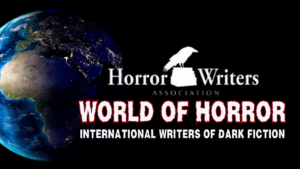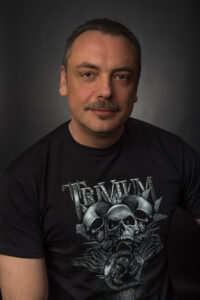World of Horror: Interview with Alessandro Manzetti

Alessandro Manzetti (Rome, Italy) is a three-time Bram Stoker Award-winning writer, editor, scriptwriter and essayist of horror fiction and dark poetry. His work has been published extensively (more than 40 books) in Italian and English. Among his publications in English: the novel Naraka (2018), the novella The Keeper of Chernobyl (2019), the collections The Radioactive Bride (2020) and The Garden of Delight (2017) the poetry collections Whitechapel Rhapsody (2020), The Place of Broken Things (2019, with Linda D. Addison), War (2018, with Marge Simon), Sacrificial Nights (2016, with Bruce Boston) and Eden Underground (2015), the graphic novels Kraken Inferno (2022), The Inhabitant of the Lake (2021), Calcutta Horror (2019), Her Life Matters (2020), and the essay/guide 150 Exquisite Horror Books (2021). His stories and poems have appeared in Italian, USA, UK, Australian, Canadian, Russian and Polish anthologies and magazines.
Website: www.battiago.com
Facebook: www.facebook.com/alessandro.manzetti.5
Twitter: amanzetti

What was it about the horror genre that drew you to it?
The unknown, other realities that lurk in the dark, or simply invisible to human eyes, that you can imagine in so many ways. And then horror represents a door to open, which leads to ancestral fears and emotions. When I was fifteen I read my first story by H.P. Lovecraft, The Case Of Charles Dexter Ward, and what was not described by the author, but only suggested with words, sounds and more, struck me a lot, making me explore part of the story in my own way. Since then, horror literature has always had a special place in me, until today.
Is there a horror tradition in your country, in your culture? A taste for horror, a market? Not necessarily literature; perhaps oral tradition too.
In Italian culture there are many horror traditions, different for each region. They all came to life from superstitions and syncretism between Christianity and paganism, handed down for generations, especially in small towns. Many of them have oral and rural origins, in the form of stories told by the elderly, with a metaphorical meaning, or as warnings. Italian folklore is rich in this sense, having been a crossroads of peoples and traditions, including ghosts, demons, creatures, witches (many of them linked to the processes of the Inquisition), incarnations of nightmares and revenge, or demiurges of events such as earthquakes, famines, epidemics. Italian horror writers have a lot of material of this kind for their stories, to make known the peculiarities of our territories, with myths and legends capable of telling the dark imaginary of our country.
Who are some of your favorite characters in horror, internationally and/or in your own culture?
Well, among my favorite characters in horror, internationally, I should mention Clive Barker’s Pinhead, something new among the usual villains or monsters protagonists of horror books. The strange connection between pain and pleasure, which takes its cue from deep-rooted human drives, is very interesting. Dracula is also a character that always stays in the mind, with his uneasy relationship with Mina Harker. Among the minor horror characters, I really like the ghostly woman in the bathtub of room 217 of the Overlook Hotel, in the novel The Shining by Stephen King. As for the Greek and Latin influences of my country, Italy, I’ve always been fascinated by mythological creatures like Medusa and the Harpies. Or, linked to my popular culture in more modern times, Janara comes to mind, a solitary witch of the peasant tradition of Southern Italy (in Campania region), who keeps ancient secrets, linked to the Roman goddess Diana. Thinking of the city where I was born, Rome, the legend of the ghost of the noblewoman Olympia Pamphili has always attracted me; they say she wanders around Piazza Navona on full moon nights, during heavy storms, in a carriage driven by a headless coachman and driven by four black horses that spit fire. After crossing Ponte Sisto, she disappears into the Tiber River where devils come to take her to hell. I really like female horror characters, and I often use them as the main character of my stories.
Do you make a conscious effort to include characters and settings from your country in your writing and if so, what do you want to portray?
I don’t often include characters and settings from my country in my stories. My way of writing is more ‘international’, both in terms of location and imagery, as I am very interested in different cultures. I think a writer can find seeds for a good story anywhere: the world it’s so big, and I don’t like too narrow boundaries. In fact, the last book I wrote (a novella, just released in Italian) tells a story set in the infamous Boleskine House (where Aleister Crowley lived for a short time, to attempt black magic experiments), in Scotland. In any case, it is obvious that my country’s heritage indirectly influences my imagination and style.
If you are not a native English speaker, but write in English, do you first think of horror in your native language or English? How do you draft them in your mind, in English or your mother tongue?
Since I wrote several works in English (fiction, poetry, comics script) now I write directly in English the works that will be published abroad, with the help of my current editor, Karen Runge. When I think to a story (or a poem, or script), there’s no language in my mind, only images to be converted into words, in Italian or English, depending on the project. As for poems, writing in English is more easy to me, in terms of rhythm and musicality of words.
What has writing horror taught you about the world and yourself?
Good question… writing horror has probably taught me more about myself, considering that in my stories I try to tell the world I’ve known during my life. I learned that writing is like pointing a light at our unconscious and dark side, to seeing them better, discovering them more and more. It’s not always a pleasant process; each step of knowledge leads us to greater awareness, but also, consequently, towards uncertainty and, in many cases, disillusionment.
How have you seen the horror genre change over the years? And how do you think it will continue to evolve, both in the US and in your country?
It is not easy to answer this question briefly. Considering the modern era, the horror genre changed a lot in 1986, with the rise of splatterpunk and a new vision of horror fiction, which brought us new interpreters such as Clive Barker, Poppy Z. Brite and many others. In the last ten, fifteen years, horror fiction has changed again, especially in terms of themes, less and less aimed at mere entertainment, and characterized by many genre contaminations, offering a more accurate exploration of the modern world and social dynamics, always getting closer more, and coinciding in many cases, with the term ‘literature’. I also think of speculative fiction. Currently the increased visibility of female authors has enriched the genre with a peculiar sensibility. I believe that evolution of horror fiction will continue on this path, at least for the next ten years. Perhaps, in the future, some hybrid formats between games and fiction could be a new frontier. As far as Italy is concerned, unfortunately it’s still quite isolated from the international horror movement, due to language-related issues, and therefore retraces the same evolution with a few years delay, differentiating itself for the strong link to the traditions of our territory. As for other countries, outside United States and England, I’m seeing the most interesting experiments with something new, especially in terms of contamination and narrative structures, which blends new trends with the typical imagery of some countries. I am thinking of African, Asian and Middle Eastern authors, who are starting to shine on the market, as well as new Europeans. But as I said, it is a question that deserves a much broader answer.
How do you feel the International horror writing community has been represented thus far in the market and what hopes do you have for representation going forward?
The international community of horror writers has been represented for many years, in particular, by the Horror Writers Association, which has contributed a lot to the cause and to the enhancement and diffusion of the genre and writers, with excellent results, even if a real ‘internationalization’ of the association is not as yet to be made. I think it is difficult to centralize everything in a single association, in my opinion, an operational branch (not simple chapters) would be needed in Europe, first of all, and then in Africa and Asia. Each of these continents are characterized by different dynamics (of languages, markets, needs) which cannot be reduced to those regulated by other countries. It would be useful to offer a certain autonomy to these branches, with people/officers who know their respective markets, able to carry out specific projects in those areas. Obviously, all this is not easy, and it takes time, but we should start taking this direction. Specific projects to support translations of non-English language works could be a very important key to solving many current problems.
What is one piece of advice you would give horror authors today?
Follow your own vision, without lining up on commercial tracks, and offer your readers yourself, without fear. I sometimes call this ‘showing readers our black jewels’; I mean our wounds, uncertainties, pains, dreams, life experiences, things of the world we have seen with our own eyes, which can be set, like gems, in stories that can be authentically imagined and lived, even within the limits and the forms of fiction. The reader always notices when the author puts all of himself into a book, not only pursuing the goal of selling as many copies as possible. This means being writers, and courageous. Time will prove you right.
And to the writers from your country out there who are just getting started, what advice would you give them?
The same advice, see above. And to learn English.



